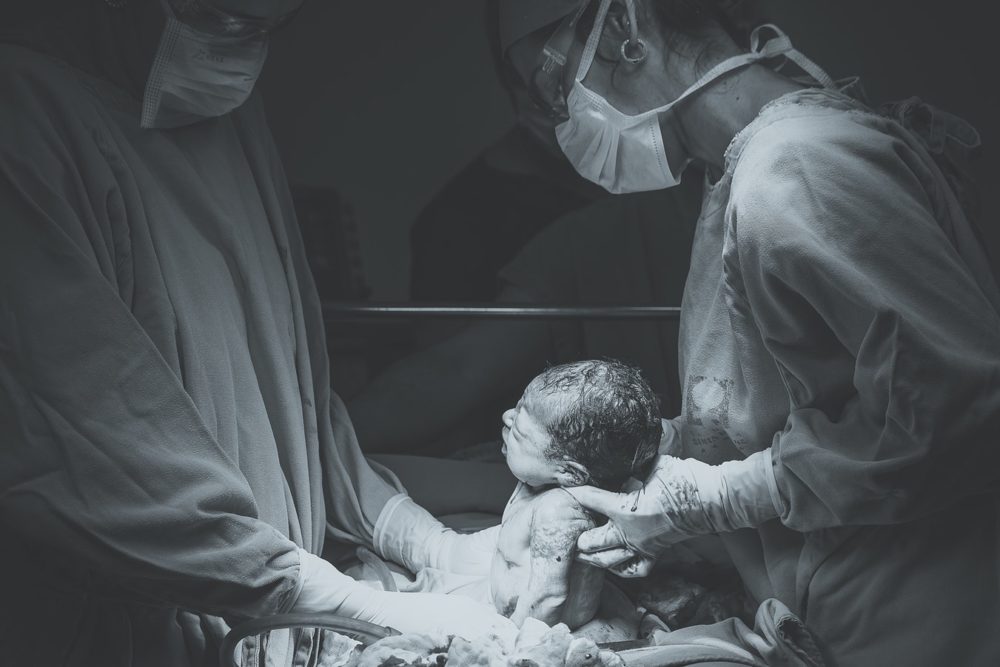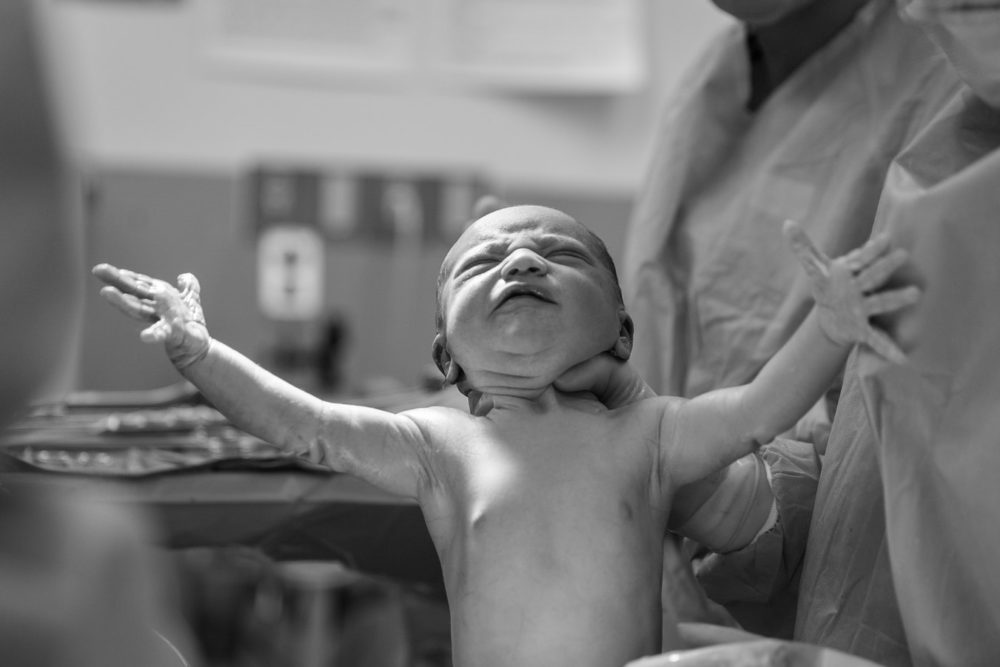
If there’s one regret I have in my time as a mother, it’s not exploring having a doula during Rho’s birth.Â
Here’s why. I had a textbook hospital delivery, with all the standard interventions. And it may have contributed to my postpartum depression.
I was slow to dilate. I was given Pitocin.
The baby’s heartbeat plummeted. I was taken off Pitocin, moved around a ton, and generally freaked out if my baby was okay.Â
After laboring for 18 hours and this happening twice, I was given the option of laboring naturally or getting a C-section – which didn’t feel much like an option at all.
I went for the latter, and Rho was born 45 minutes later.
I looked at him after he was cleaned up, and he and my husband were whisked away as I made my way into recovery. I was alone for the hour or so, where I got chronic chills and my anesthesia wore off, leaving me in a ton of pain.Â
I was alone. I was scared. And I didn’t have my phone to tell anyone to get their as$ to me and help me.
When I was finally wheeled into my postpartum room (with all the grandparents and my husband waiting), I was a mess.Â
Thankfully, I had an angel in my postpartum nurse who whisked the parents out of the room, quickly administered pain medication, and brought my baby to me so I could bond with him.
Did it all work out in the end? Sure. And did Rho and I leave the hospital alive? Yes – and I consider myself lucky.
But I didn’t know what I didn’t know. I didn’t know that C-sections are largely becoming the norm – they make up 1.2M of all births in America, and 31% of all reported American births (and growing). I didn’t know that midwives can administer epidurals and deliver at many hospitals’ birthing centers.
I was Jon Snow. I knew nothing.
Looking back on it all now, my birth experience could have been different. I could have – and should have – felt empowered and knowledgable in my decisions, and not like a bystander in the birth of my own child.
If I were do it all again, I absolutely would have explored getting a doula. And the more I research it, the more I’m keen on the midwife/doula approach to childbirth, versus the traditional hospital approach.
That’s me. And this was my experience, and what I choose for myself if and when I have another child. I hope the essay from Jenny Mayer, a doula and the founder of Baby Caravan, will help inform your plan as well.
A doula, by definition is someone who provides emotional, informational and physical support to a family during pregnancy, childbirth and/or the first months home with a newborn. We are not medical professionals. Doulas do not deliver babies or provide and clinical or diagnostic care. Doulas are hired by families to provide education about pregnancy, the labor and birth process, breastfeeding, and newborn cared. Doulas provide emotional support through the ups and downs of what is often an emotional rollercoaster. Did your Dr. mention something at your last prenatal visit that has you a bit confused? Text your doula! She’ll chat it out with you and help you develop a short list of questions to follow up with your doctor to gain clarity. Perhaps you’re uncertain how breastfeeding is going or if your baby is latching well. Your doula can help you assess and can provide referrals to lactation consultants if it’s needed. Doulas are great sources of evidence based information, community resources, and professional referrals when needed.
Even those close to me aren’t always 100% sure what a doula does. “Oh Jen she does that doula thing and delivers babies.” Yes, a lot of people think I deliver babies instead of a doctor. We doulas don’t, and there’s always a licensed medical professional taking care of mom and baby’s health.
Even before the labor begins, a birth doula spends a lot of time with her mother on education and preparing for the birth experience. We never know exactly how the labor will unfold, but it’s our goal as a doula to help our mothers prepare for the hospital experience or birth location, and be a least a bit familiar with common hospital procedures they may or may not see during the birth.

During the labor, doulas provide a lot of reassurance, a lot. While it is obviously helpful for the laboring mom, but having a doula there helps to normalize the experience for the birth partner. Even when a birth is textbook, it can look jarring to someone who hasn’t witnessed it before. So getting the partner’s nerves settled is huge. Then he or she is able to play an even bigger role as a support person then they may have otherwise, and the doula can provide on the spot coaching of what might be the most helpful. Doulas bring different comfort measures to the table such as massage, guided imagery, breathing techniques, and a variety of laboring positions to facilitate the decent of the baby into the birth canal. Many of our clients use an epidural, and a doula is helpful here too in getting mom set up for therapeutic rest (yep! you can nap with an epidural) and help both parents get ready for the pushing stage. At any time in labor, if things don’t go as planned and the medical team proposes an intervention, the doula would help you communicate with your team and make sure any of your questions or concerns were addressed. She would also be a good emotional support if things were scary.
Supporting clients through a planned or unplanned C-section is where a doula can be very beneficial, but a lot of people aren’t aware that this is something we can help with.  What I’ve found with supporting clients through c-sections is that the more relaxed a mom can go into the surgery, the more relaxed she’ll come out into recovery. C-sections are an anxiety producing event – it’s a major abdominal surgery – so it can be very comforting and reassuring to have a professional there to be with your before and after the surgery. I often hear people refer to c-sections as having a baby “the easy wayâ€. While I hope that all c-sections are easy and smooth, they can be frightening and uncomfortable. It’s not uncommon to shake uncontrollably during the c-section, or to feel very out of it in recovery afterward, or to have some pain. Having a doula there with you in recovery can help by being your advocate if you’re in pain, assist with the first breastfeeding because it can be hard to hold the baby afterward, and simply be there to take care of you. You’ll have the nurses and doctors as well, but they have other patients to assist and won’t be at your bedside the whole time.
Following the birth, your doula is there to help with the first breastfeeding, to take some family photos if you wish, order you protein-rich food, and help pack your bags so you can be moved to the postpartum room. The birth doula returns about a week later to your home to chat about your birth experience. This is a wonderful time to share your story and ask any questions you might have.

While birth support is so incredibly beneficial and helpful, I feel in the postpartum space is an area where doulas are even more underutilized. Postpartum doulas care for the mother and father, so they can take care of the baby. They provide a lot of education and reassurance to help build the new parents confidence and skill set. If baby care is needed, the doula can absolutely tend to the baby so mom or dad can take a nap, run an errand or take a shower.  Postpartum doulas can also cook food, take care of laundry, order groceries, do some nursery organizing. Basically, they’ll do (mostly) anything that helps the household move forward after welcoming a baby home.
Perhaps you’re newly home with your baby from the hospital and your mother-in-law is telling you one thing about taking care or your baby, and your mother is telling you the exact opposite and you don’t know who to listen to. Call your doula, have her come over, and she’ll walk you through the current evidence based recommendations and let you know what your options are so you can choose how to care for your baby. This helps moms and dads develop their parenting confidence and parenting identity.
My company is Baby Caravan (based in New York City), and we help expectant and new parents find the perfect doula fit from our team of vetted doulas. I help parents through the hiring process by scheduling a 20 minute call to get a sense of where they are at in their journey, and what type of doula they are seeking to work with. From there I’ll send the family a list of available doulas. They will take a look at their profiles on our site and choose 2-3 doulas to meet with. We then set up some consults for the family with a few doulas. It’s so important to interview a 2-3 doulas to find a good fit. Some much of this work is about the personal fit and trust, which is why interviewing doulas is so important. You want to work with someone you feel very, very comfortable with.
Once the family has chosen their doula to work with, we get them all set up with the paperwork and invoicing. Then the doula schedules their first visit together and they get to work.
It’s my intention to have a diverse group of doulas on the Baby Caravan roster to reflect the diversity of New York City. Our team is made up of doulas from different countries, different areas of the US, native New Yorkers, a variety of religious and spiritual backgrounds, sexual orientation and race.  Sometimes women of color feel most comfortable working with another woman of color, and that’s important. Or a LGBITQ family might prefer to have a LGBITQ doula, which is great too. I want our clients to have a lot of options when choosing their doula, and to feel represented themselves.
Depending on the doula’s experience and other trainings and certifications she might hold, such as a massage therapist or as a Certified Lactation Counselor, the rates range from $1200-$2600 for a standard birth package of 2 prenatal visits prior to the birth to review childbirth education, review the parents preferences for the day of the birth, chat about any prior experiences that might affect the birthing process, and help families prepare for those first few weeks home from the hospital. The doula is on call 24/7 for whenever the client goes into labor. Even if it’s 2am on a Saturday night, or 9am on Monday morning, the doula will be ready for the call. Following the birth, the doula returns for a postpartum visit to check in and see how everyone is settling in and if any further resources are needed. For postpartum support, the rates range from $45-50 per hour. Families usually purchase a package of hours; 20-200 hours in the first month is typical. Postpartum doulas are available for daytime support, as well as overnight care so parents can catch some much needed rest.
Jennifer Mayer supports parents through pregnancy, birth, new parenthood and the transition back to work. She is the founder of Baby Caravan, a birth & postpartum doula agency and Baby Caravan at Work, a corporate consulting practice based in New York City. Jennifer lives in Brooklyn with her husband and son.You can follow her on Instagram at BabyCaravan or at JennyLeighMayer.

